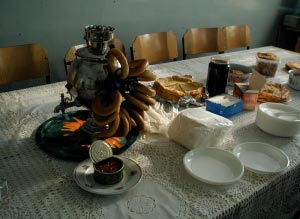- Преподавателю
- Иностранные языки
- Внеклассное мероприятие. Конспект урока. Масленница
Внеклассное мероприятие. Конспект урока. Масленница
| Раздел | Иностранные языки |
| Класс | 5 класс |
| Тип | Конспекты |
| Автор | Кондрашова А.А. |
| Дата | 21.01.2016 |
| Формат | doc |
| Изображения | Есть |
МБОУ СОШ № 1 учитель английского языка Кондрашова Анна Александровна Внеклассное мероприятие для 5-6-х классов "Масленица" на английском языке

Цель: расширение знаний учащихся о собственной культуре и развитие способности к ведению диалога культур.
Задачи:
-
Создать условия для совершенствования устной речи учащихся.
-
Развить творческие способности через систему проектирования.
-
Активизация познавательной деятельности учащихся посредством введения новых педагогических технологий.
Оборудование:
-
Стол, накрытый к чаю, с самоваром, блинами и баранками.
-
Творческие работы учащихся с описанием рецептов блинов, традиционных игр и обычаев на английском языке.

ТСО: видеомагнитофон.
ХОД УРОКА
Teacher: Hello, Kathryn! (Kathryn is our English teacher this year. She is from Buckingham.) Hello, boys and girls! Tell me please, what date is it today?
Pupils: It is the 9-th of March.
Teacher: Russian people celebrate one of their national holidays on this week. Tell me what holiday it is?
Pupils: It is Maslenitsa.
Teacher: Good. Let's tell Kathryn about this holiday.
Далее показ отрывка из фильма "Сибирский цирюльник", сцена - Масленица.
Shrovetide
Pupil 1: There are many holidays and traditions in our country.
Pupil 2: One of them is Shrovetide. It's an ancient Russian holiday, which dates back to the 9-th century. This holiday lasts for a week.
Pupil 3: Russian people celebrate it at the end of February or at the beginning of March.
Pupil 4: They say "good-bye" to winter in these days.
Pupil 5: It is an old tradition to cook blini and eat them with sour cream, caviar, honey and butter.
Pupil 6: Blin is the symbol of the sun.
Pupil 7: Shrovetide is the most cheerful of all Russian holidays.
Pupil 8: During this holiday we celebrate the beginning of spring. Not to participate in this holiday means to live in poverty for the rest of the year. Each days of Shrovetide has its own rituals.
Pupil 9: Usually this holiday is celebrated in parks and squares. People dance, sing, toboggan, build ice sculptures.
Pupil 10: People prepare fires and burn straw scarecrows of winter. On Sunday during Shrovetide, they forgive people for their offences.
Pupils: We like this old Russian tradition. We like to eat pancakes and we like spring best of all.
Pupils: Kathryn, would you like to try Russian blini? Sit at the table, please. Help yourself! It is a Russian samovar. Have you ever tried Russian blini? Are they tasty?
Kathryn: Yes, it's delicious.
Pupils: Do you cook blini in Great Britain.
Kathryn: Yes, we do. We eat them with lemon and sugar.
Pupils: Do you celebrate Maslenitsa in Great Britain?
Kathryn: We have Shrove Tuesday. It is an old holiday. It symbolizes the beginning of spring, too. It is in February or in March. There are pancakes races on Shrove Tuesday. People race with a frying pan in one hand. They have to throw the pancake in the air and catch it again in the frying pan. It's very funny.
Pupils: Look at the recipes of Russian blini. They are for you.
Kathryn: Oh, thank you.
Далее приводятся два рецепта, хотя их было больше - каждый ученик написал свой рецепт.
Recipes of Russian blini:
I . Take two eggs and 0.5 l milk. Mix them into a bowl. Add some salt and suger. Mix together. Add 2 cups of flour, ? teaspoon of baking powder and some oil. Mix it again. Fry your blini. Put your blin on the plate. Add caviar and roll it. Enjoy your meal!
. Take two eggs and 0.5 l milk. Mix them into a bowl. Add some salt and suger. Mix together. Add 2 cups of flour, ? teaspoon of baking powder and some oil. Mix it again. Fry your blini. Put your blin on the plate. Add caviar and roll it. Enjoy your meal!
II. 1,5 cup wheat flour. 10 gm sugar, 10 gm vegetable oil 2 eggs, some yeast, salt, 2 cups of milk. Mix well. Wait for an hour. Then bake your blini. Put blin on the plate and put sour cream on it. Bon appetite!


